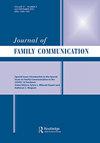Associations between Parents’ Negative Talk about Aging and Young Adults’ Negative Affect and Efficacy Related to Aging
IF 2.2
Q2 COMMUNICATION
引用次数: 1
Abstract
ABSTRACT Guided by the communicative ecology model of successful aging, this study examined the relationship between the frequency of parents’ negative talk about aging (i.e., complaints about age and use of age-based excuses) and young adult children’s negative affect and efficacy about aging. It also investigated the degree to which a family’s general tendency to engage in open communication affected these outcomes. Cross-sectional survey data indicated that the frequency of mothers’ and fathers’ complaints about aging (as reported by young adults) predicted young adults’ negative affect and efficacy related to aging, respectively. The relationship between mothers’ use of age excuses and young adults’ negative affect about aging was moderated by their families’ tendency to engage in open communication.父母对衰老的负面评价与年轻人对衰老的消极影响和疗效的关系
摘要在成功老龄化的交际生态学模型指导下,本研究考察了父母对老龄化的负面言论(即对年龄的抱怨和使用基于年龄的借口)的频率与成年儿童对老龄化负面影响和功效之间的关系。它还调查了一个家庭参与公开交流的普遍倾向对这些结果的影响程度。横断面调查数据表明,母亲和父亲对衰老的抱怨频率(如年轻人所报告的)分别预测了年轻人对衰老的负面影响和疗效。母亲使用年龄借口与年轻人对衰老的负面影响之间的关系受到其家庭参与公开交流的倾向的调节。
本文章由计算机程序翻译,如有差异,请以英文原文为准。
求助全文
约1分钟内获得全文
求助全文

 求助内容:
求助内容: 应助结果提醒方式:
应助结果提醒方式:


